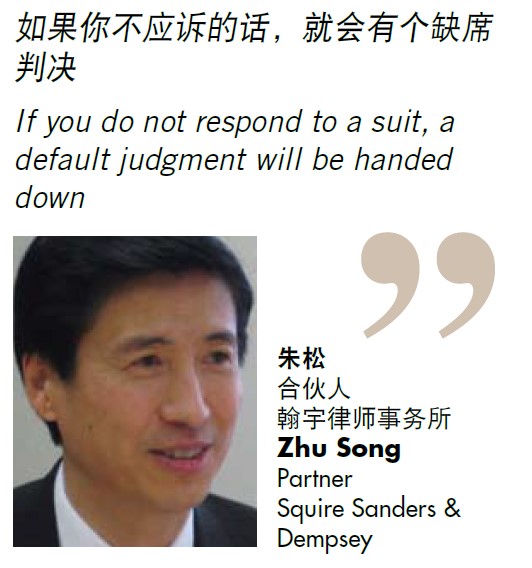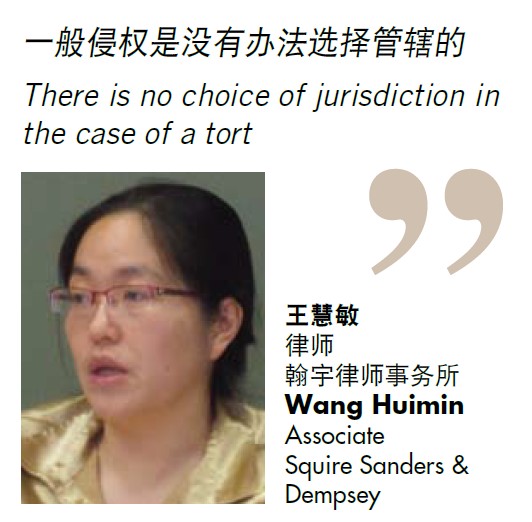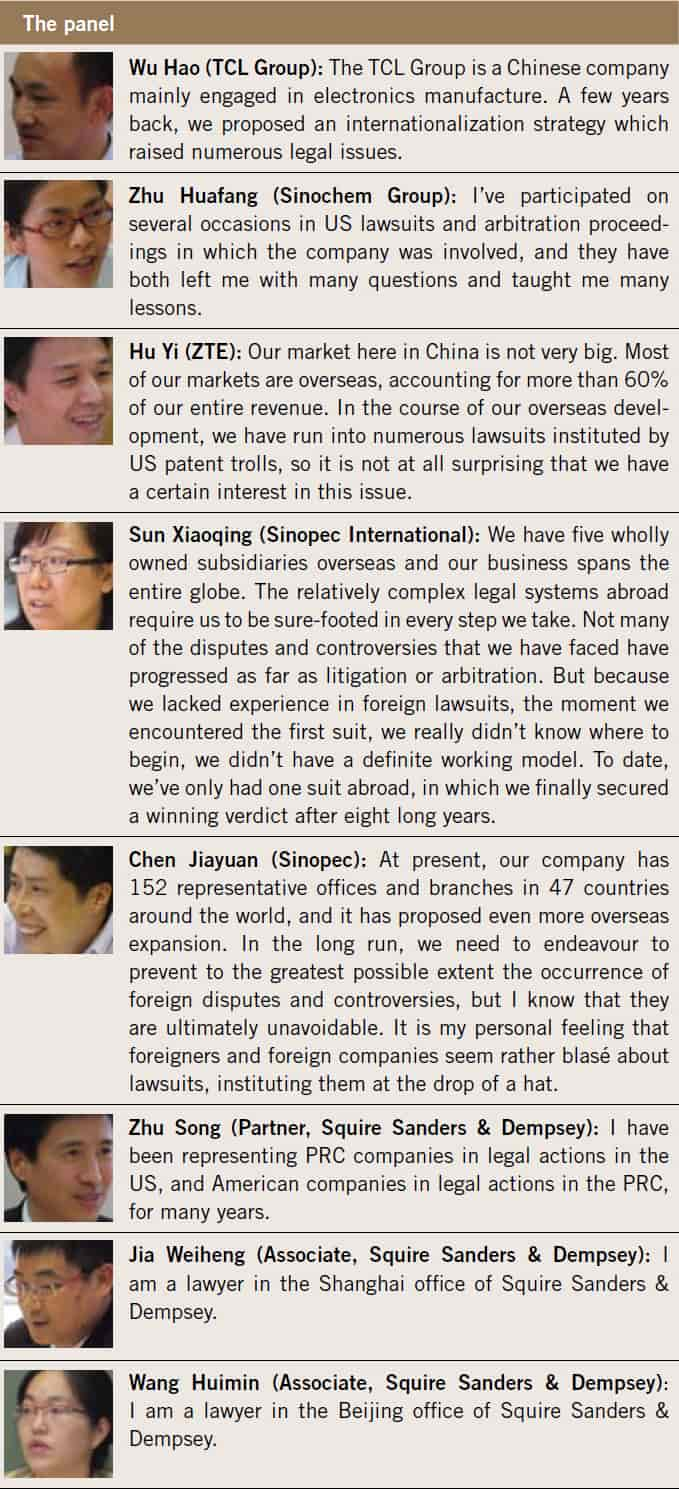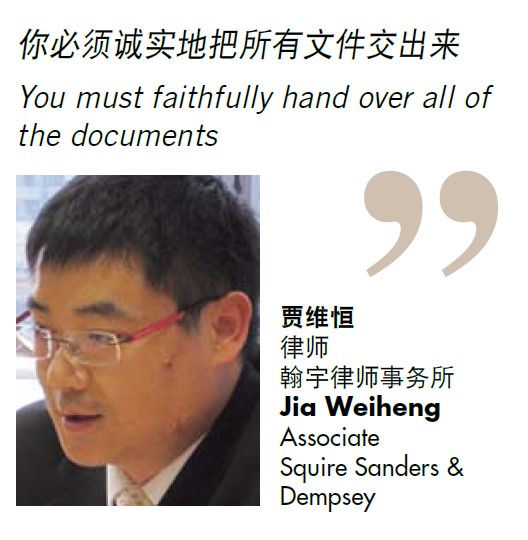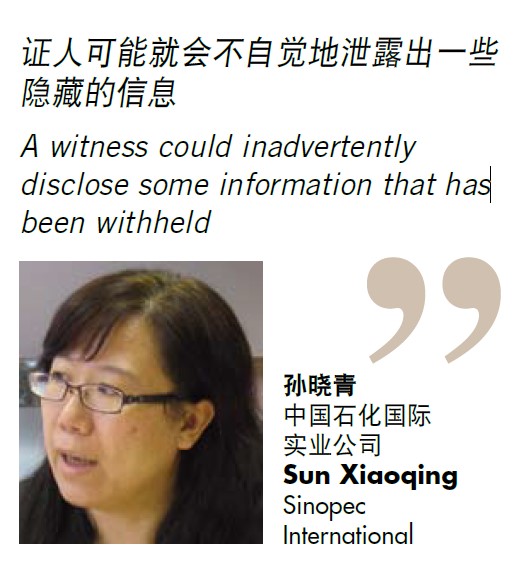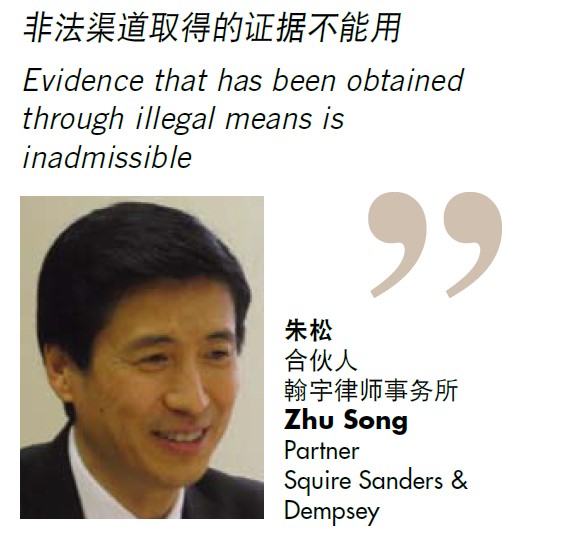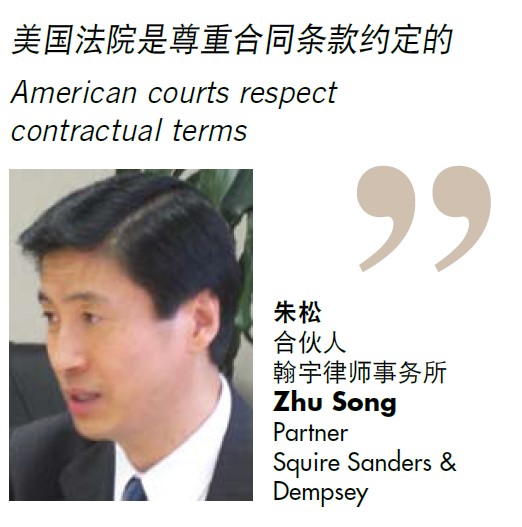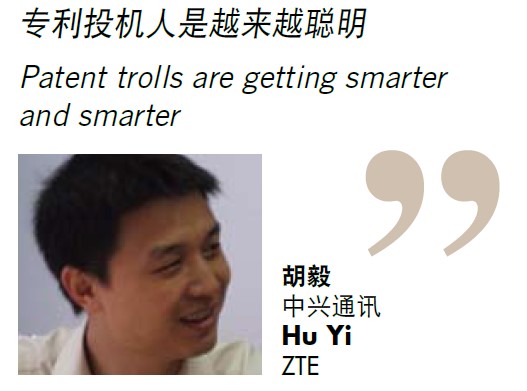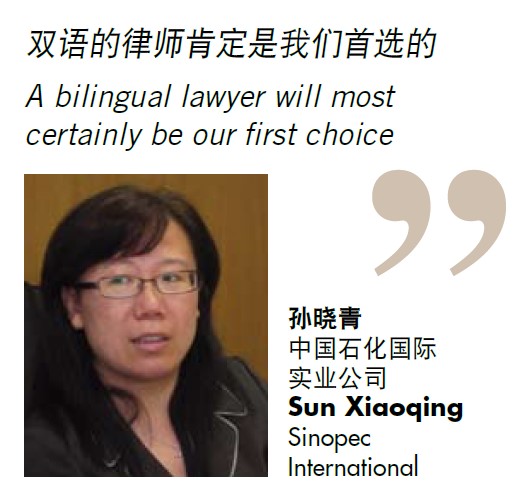China Business Law Journal and Squire Sanders & Dempsey recently conducted a round-table discussion in Beijing to investigate the strategies available to corporate counsel to prevent and mitigate the risk of US litigation and arbitration
To respond or not to respond to a lawsuit?
Zhu Song, Squire Sanders & Dempsey: In view of the circumstances that everyone here has just spoken about in their introductions, I’d like to talk a bit about my experience of lawsuits in the US that PRC companies have faced in developing the US market. For the past 20 or 30 years, PRC companies have been trying to sell low-value consumer goods in the US and, with the exception of some antidumping and countervailing duty trade friction, there haven’t been any major conflicts with American companies. However, in the last few years, some large state-owned and private enterprises have gone to the US to sell industrial and hi-tech products, such as automobiles, televisions and washing machines. For American companies, if the worst comes to the worst and they lost the Chinese market, not all was lost as they still historically had the American market. However, with the entry of PRC companies into the US, they have begun to seriously consider how to prevent Chinese companies’ from establishing themselves in that market. One very effective method has been the use of litigation, such as patent infringement suits.
How does a PRC company respond to a US lawsuit? Generally speaking, a small company will elect not to respond to the suit. At present there is a suit pending in the US about gypsum board produced in China which mainly involves some relatively small companies from Shandong province (Editor’s note: please see Exporting safely to the US in volume 1 issue 3 of China Business Law Journal.) If they respond to the suit, damages could amount to as much as US$100 billion to US$300 billion. Even if they could reach a settlement with the plaintiffs, it is unlikely that the figure of US$300 billion would dramatically drop to US$3 million. Furthermore, since the suit, those companies have not made any further exports to the US. In such circumstances, not responding to the suit was entirely the right choice.
However, not responding to a suit is not always the right way to go. Why? I have a feeling that some companies here in China don’t realize this: if you do not respond to a suit, a default judgment will be handed down. Many companies in the US are happy to get such a default judgment. Why? Well, after getting such a judgment they can take it and have it enforced in any state in the US. All of the property in the US of the Chinese company that is the defendant could be frozen, forfeited and auctioned, and the proceeds then used to pay the damages. If things come to this, it will be very difficult for that Chinese company to continue trading with American companies. An even more important point is that such a default US judgment can be taken and enforced in other countries and regions like the EU and Japan.
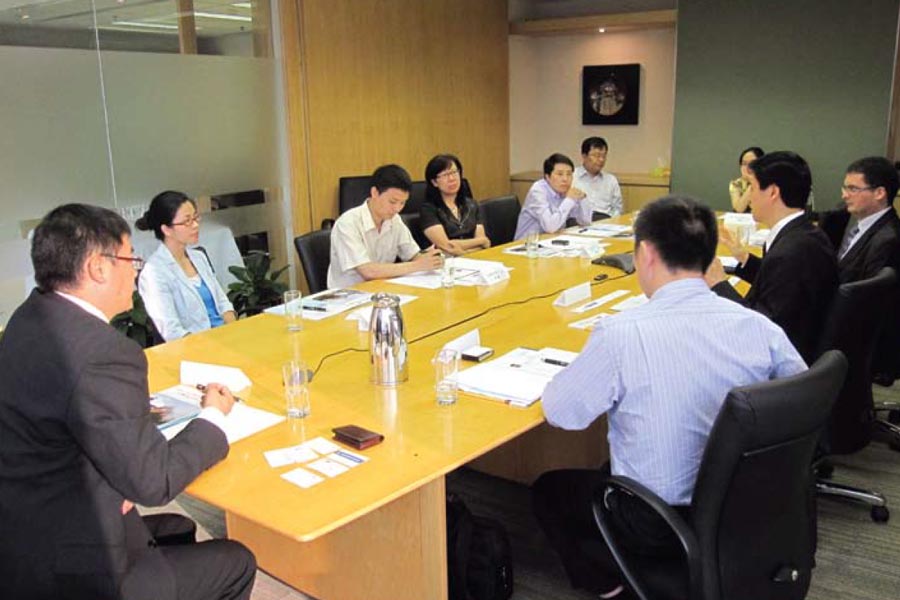
So, I believe that before a company in China decides whether or not to respond to a lawsuit in the US, it has to give serious consideration to the effect its decision will have on its future business. For large companies such as those represented here at this table, I don’t think that not responding to a suit is an option, because you do a lot of business in the US. If a default verdict is rendered against you, not only will you be unable to sell the products involved in the suit, but you will be unable to sell other products too.
Piercing the corporate veil
Zhu Huafang (Sinochem Group): I have a question concerning the enforcement of judgments. If a state-owned enterprise loses a suit in the US but has no property in the US against which the enforcement can be effected, can enforcement take place against the property of its affiliates in the US (assuming that it has such affiliates)? Is it possible that US courts will hold that the relationship between PRC state-owned companies is so close that they are in fact just one enterprise?
Zhu Song: This touches on the issue of what Chinese companies should do to avoid foreign lawsuits. One important way of guarding against lawsuits is to establish the framework for the entire corporate group – the parent and subsidiaries must be separate, and the subsidiaries have to have their own independent boards of directors. What’s more, when a US subsidiary conducts a transaction with its Chinese parent company, it must do so on an arm’s length basis. If it doesn’t a US court will say that the US subsidiary is not an independent company and is controlled by its Chinese parent, and therefore the principle of “piercing the corporate veil” will apply.
Chen Jiayuan (Sinopec): When we launch a business in the US or another country, we will usually do so by establishing a small limited liability company. Supposing that, if this company becomes embroiled in a dispute, we ignore it and, if the worst comes to the worst, it goes bankrupt. In this way, could the parent in China effectively avoid liability during the lawsuit and the enforcement process?
Zhu Song: I think that there is still a risk. Firstly, if you do not respond to a suit, a default judgment will be rendered. Because you did not respond to the suit and did not provide evidence, the damages awarded in the judgment will essentially be what the other party said they were. As the other party does not know the size of your business, the amount of the damages will usually be large. For example, let’s say that your foreign subsidiary makes a profit of only US$50,000, if you do not respond to a suit, the plaintiff might request that the court award damages of US$5 million. However, if you respond to the suit and explain the situation, the plaintiff will be reluctant to incur a large amount in attorneys’ fees for damages of only US$50,000. Accordingly, it may be possible to reach a settlement with the plaintiff which will only require you to pay damages of US$50,000. Secondly, if the damages are beyond the foreign subsidiary’s means, it can in theory declare bankruptcy. However, should the court rule that that subsidiary is controlled by its Chinese parent, the parent will have no choice but to pay that US$5 million. Therefore, under such a circumstance, not responding to the suit is not a realistic option.
Chen Jiayuan: Is it possible that the parent will be required to bear the damages? How can the parent be dragged in?
Zhu Song: Yes, it is possible. The main reason is the principle of “piercing the corporate veil” which I just described.
Sun Xiaoqing (Sinopec International): The reason that large companies like us establish subsidiaries rather than branches is to establish a firewall, to avoid liability. If a subsidiary, from the perspective of the corporate framework and legal documents, is separate and independent from the parent, on what grounds under American law can a plaintiff drag the parent into a lawsuit against the subsidiary?
Zhu Huafang: With respect to the independence of subsidiaries, large group companies in China have done quite well, at least, from the perspective of corporate governance and financial affairs. Although in terms of internal group company management there are still some internal reporting and approval procedures, what is ultimately manifested in company legal documents are resolutions of the board of directors or the shareholders’ general meeting of the subsidiary.
Zhu Song: In addition to the company’s governance structure, there is still the issue of how the Chinese parent conducts transactions with its subsidiaries. For example, if in selling the parent’s products in the US you don’t want the US subsidiary to make a profit, so you have it sell the products on at the price at which the parent sold the products to it, the subsidiary will be deemed to be lacking in independent personality, no matter how sound your internal management procedures are.
Sun Xiaoqing: The tax authorities will also investigate the transfer pricing issue.
Wang Huimin (Squire Sanders & Dempsey): There are also other situations in which a parent could be dragged into a lawsuit. One such situation is the so-called “one team, two brands”, which is commonly seen here in China. In the US, such an arrangement has its dangers. If almost all of the senior and middle management of the foreign subsidiary also serve in senior positions in the Chinese parent, the plaintiff will claim that it is the same team that manages both companies, so the subsidiary is directly controlled by the parent. A second situation would be the transfer pricing mentioned by Mr Zhu. An independent company could not act in this way. The third situation involves the power of appointment. If the appointment of relatively low level personnel of the US subsidiary requires a decision by the Chinese parent, this is also a situation where the US courts would hold that the subsidiary is not independent. A fourth situation would be a cause of action that implicates the upstream parent. Taking the automotive industry as an example, the parent and subsidiaries are found at different links in the production chain (such as design, production and sales). At the outset, the plaintiff may just claim product quality liability and name the producer (i.e. the subsidiary) as defendant, however, if, subsequently, it also claims design liability, it will additionally name the designer (i.e. the parent) as defendant.
Sun Xiaoqing: The corporate governance structure and the market driven operations that should govern the relationship between parents and subsidiaries just discussed may not be so risky. The operations of our company basically achieve this, not intentionally to avoid lawsuits but rather to satisfy the requirements of regulators around the world. However, the parent/subsidiary production chain issue just mentioned by Ms Wang is a risk that is not so easily avoided. Although in general we have established trading companies abroad to sell our products produced here at home in foreign countries, if a trading company abroad bears liability in respect of such products, the parent here in China will almost certainly be drawn into the suit.
The headache of ‘discovery’
Zhu Huafang: Since it is difficult for a plaintiff to secure evidence to prove that there is no independence between a Chinese parent and its subsidiary, or that such independence has been lost, how will the court require evidence to be adduced? Will it require the US subsidiary of the Chinese company to adduce the evidence?
Sun Xiaoqing: In one case in which we were the defendant, the judge of a US court asked us to provide comprehensive evidence to show whether or not our subsidiary was controlled by the parent. The judge even subsequently asked us to submit numerous internal e-mails as evidence. However, on the issue of the burden of proof I still have questions: is it the plaintiff who bears the burden of proof, or the defendant? If the plaintiff claims that there is a connection between our parent and subsidiary, and says that our subsidiary is controlled by the parent, isn’t it up to the plaintiff to provide the evidence?
Zhu Song: This involves a very important concept in American litigation, namely discovery. The burden of proof in the evidence-gathering process in the US is, relatively speaking, not that important. For example, if in a legal action an American company names both the Chinese parent and its US subsidiary as defendants, once the Chinese parent responds to the suit, it will immediately receive a discovery list from the plaintiff, requiring it to provide numerous pieces of evidence, like all the e-mail correspondence between the Chinese parent and subsidiary as just mentioned by Ms Sun. That is because the plaintiff can claim that these e-mails are pertinent to the evidence that it will later present in court. Accordingly, the US discovery process makes it easy for the plaintiff to obtain such evidence.
Zhu Huafang: Can the defendant raise objections against the plaintiff’s discovery list? For example, claiming that the requested evidence is irrelevant to the case? And if I withhold certain pieces of evidence that I am unwilling to produce, what means do the plaintiff and court have at their disposal to come and check?
Sun Xiaoqing: In our case, the lawyers tried to intimidate us by saying that if we didn’t hand over those e-mails, the US court would seize our computers’ server.
Jia Weiheng (Squire Sanders & Dempsey): We, as lawyers, will generally tell the client that you must faithfully hand over all of the documents. Although in normal circumstances it would be impossible for the court to know that you concealed anything, if, by virtue of one or two e-mails, the court could deduce that you had withheld something, it would deem that you failed to execute the court order in good faith. That could ultimately prove adverse to you at the time of the judgment.
Wang Huimin: Such an act could even constitute criminal liability for contempt of court. In assisting Chinese enterprises in dealing with US lawsuits, one thing that causes headaches is explaining to them the American system of discovery. It is vastly different from the relatively simple procedure for adducing evidence here in the PRC. Our advice to PRC clients is: (1) someone must be assigned to be responsible for the matter and ensure that all of the evidence is submitted by the deadline set by the court; (2) the company and its lawyers must look over each piece of evidence, failing which the submission to the other party of evidence that is favourable to the other party could give rise to many risks for one’s own side; and (3) the evidence that is to be submitted should be categorized based on what it is meant to substantiate. In short, internal organization and coordination in the Chinese company during the discovery process is extremely important.
Zhu Song: To answer the question on the burden of proof of independent relationships between the defendant and its parent company just mentioned by Ms Sun, in the US discovery procedure, although it is the plaintiff that bears the burden of proof, the plaintiff may request such evidence from the defendant and the defendant will be required to provide it to the plaintiff. What happens if the defendant is unwilling to provide such evidence? Almost every time that I represent a Chinese company in a legal action in the US, I am asked the following question: if we don’t provide the evidence to the plaintiff, what consequences will there be? Criminally speaking, the consequences are minor. That is because if the defendant does not provide the evidence, in general it will additionally claim that it has no obligation to provide such evidence to the plaintiff. However, this will result in the plaintiff applying to the judge for the issuance of an order compelling the defendant to provide the evidence. If the defendant still fails to provide the evidence at this juncture, it can be dangerous. The court will think that the evidence that the plaintiff requested the defendant to present was for the purpose of showing that the subsidiary lacked a personality independent from that of the parent and the defendant refused to provide such evidence, so it will infer that the plaintiff’s claim is tenable, i.e. that the subsidiary and the parent are one company.
Zhu Huafang: What should be done if the requested evidence contains trade secrets?
Zhu Song: We once represented a Chinese company in a lawsuit in the US where the American company suspected that the Chinese company had infringed its trade secrets, and asked to be allowed into the Chinese company to see whether the Chinese company had used those trade secrets in its product design. Worried that its own trade secrets could be leaked, the Chinese company applied to the court for a protective order. In this way, the American plaintiff could not view the evidence, but its lawyers could, but only in the judge’s chambers. Additionally, the lawyers were not permitted to disclose the information on pain of revocation of their licences.
Sun Xiaoqing: I still feel that such a risk is too great. I’ve heard that adverse evidence in a legal action in which Toyota was involved was obtained surreptitiously by the opposite party, namely the opposite party had sent “spies” to Toyota to obtain that evidence.
Zhu Huafang: Can such evidence that has been obtained through illegal means be used in court?
Zhu Song: Evidence that has been obtained through illegal means is inadmissible. If someone is sent to the other company to obtain evidence and it is obtained illegally, such evidence cannot be used in court.
Sun Xiaoqing: One thing that is worrying is that among the documents that you provide there will be some logical connections in terms of language, content and even time. A relatively experienced lawyer reading such documents will discover these connections and deduce that you are withholding certain evidence. Furthermore, an experienced lawyer, when cross-examining a witness, will talk unendingly with the witness, at times for even up to three days. During the conversation, a witness could inadvertently disclose some information that has been withheld. This is quite worrisome.
Hu Yi (ZTE): I have a question about attorney-client privilege. Can’t a company ask its lawyers whether certain documents can be withheld, or if they are submitted, what adverse effect this could have?
Zhu Song: Generally, our US clients will give all of their documents to their lawyers to look at. We’ve had some cases in which there were 20 or 30 lawyers involved. We look at each page of evidence to see if there is any content that is subject to attorney-client privilege. If it is subject to such protection it is not submitted as evidence, and if it isn’t subject to such protection, we submit it. However, if the company claims attorney-client privilege in respect of a certain document, there must be sufficient reasons, for example, it must prepare a memorandum to explain such reasons, which, in general, is issued by another lawyer who is engaged separately and specially for this purpose. Proceeding in this manner makes the company’s claim of attorney-client privilege easier for the court to accept.
Dispute resolution clauses
Wu Hao (TCL Group): In general, how should the dispute resolution clause in a contract be written, and which is the better choice, arbitration or litigation? If litigation is opted for, which place should be selected as the place of litigation?
Zhu Song: With respect to the choice of the place of litigation, I’d first like to talk about a recent case. A Chinese company instituted a lawsuit against an American company in the US. The American company filed an objection on the grounds that the parties had agreed in their contract that any lawsuit was to be heard in a PRC court. The American court upheld this position, resulting in the PRC company losing the suit. Its only option was then to return to the PRC and institute a lawsuit there. The American company not only did not respond to the suit, but it also did not have any property in China against which judgment could be enforced. In the end, the Chinese company had no other option after securing a default decision in the PRC court but to return to the same US court and apply for enforcement. Under normal circumstances, the chances of a Chinese company being able to enforce a PRC default judgment in the US are nil. However, from the above case it can be seen that American courts respect contractual terms, so the key lies in PRC companies’ learning how to select the appropriate place of litigation and then stipulate it in the contract.
Wang Huimin: It is the usual practice of foreign companies, before entering into a foreign market, to seek the advice of local lawyers so as to gain an understanding of the legal procedures, the costs of local litigation and arbitration and the available arbitration institutions, The local lawyers will then draft dispute resolution clauses that are appropriate for the locality. In actuality, litigation and arbitration have both their advantages and disadvantages. It seems that everyone has a preference for arbitration, however, arbitration is not necessarily better because some arbitration cases may take even longer than litigation and, in general, arbitration is final, which precludes the possibility of an appeal. Secondly, consideration has to be given to the language used in arbitration or litigation – using a language with which one is not thoroughly familiar in conducting a legal procedure can create a major obstacle for oneself. Thirdly, consideration must be given as to whether enforcement can be smoothly achieved in future; and lastly, a company needs to analyse its position in each transaction: is it more likely that it will be suing the other party or is it more likely that the other party will be suing it, and whether the dispute is in the nature of a tort or a contractual relationship. In general, there is no choice of jurisdiction in the case of a tort. A decision as to whether to opt for litigation or arbitration as well as to the specific location should be made only after considering the foregoing factors.
Sun Xiaoqing: Some time back we encountered a case that involved both contractual disputes and torts. In such a circumstance, even if resolution by arbitration was specified in the contract for such tortious disputes, ultimately the only option for the parties to resolve these disputes was to institute a court action rather than an arbitration.
The demon “patent trolls”
Hu Yi: One thing of particular concern to us is patent infringement suits instituted by patent trolls in the US. How should we deal with such situations?
Zhu Song: Patent trolls are people, in some cases even lawyers, who purchase certain patents from their holders, then institute legal action for patent infringement against other companies, usually large companies. Because litigation costs are so high, large companies are usually reluctant to get involved in a lawsuit, and they prefer to reach a settlement with the patent troll by paying a relatively small amount. There is more and more of this type of thing happening in the US now, posing a major headache for technology companies doing business in the US. I believe that there are several approaches that can be taken to deal with such a situation. The first approach is not responding to the suit, although this is not a good approach. That is because if you do not respond to the suit, the patent troll will secure a default judgment that could affect a lot of your current and future business in the US. The second approach is a joint response. Generally speaking, a patent troll will institute legal actions against several companies. For example, if 30 companies are sued and the 30 companies respond together to the suits by claiming that the plaintiff’s patent is invalid, the costs falling on each company will be quite small. In practice, a patent troll will try to divide and conquer such an alliance by using various means to compel each company to reach a separate agreement with him. For example, he will say that if you settle with him now it will cost you only US$30,000, but will cost US$50,000 to settle in one year and US$100,000 to settle in three years. A Chinese company can respond to such settlement proposals as follows: if you think that the patent troll’s patent is valid and that it is possible that you actually did infringe it, you can settle with him from the very outset. Conversely, if you are convinced that you didn’t infringe his patent and you think that it is possible that his patent is invalid, you can refuse to settle and fight the case to the end.
Hu Yi: Based on our own actual experience, “for every foot the law progresses, the criminal element leaps ahead by 10”. Patent trolls are getting smarter and smarter. Firstly, a patent troll is not just using one patent in his extortion schemes, but a whole series of patents. Simply analysing whether your product conflicts with their patents is already by itself extremely difficult, not to mention applying for the cancellation of these patents. Secondly, he has numerous different strategies, for example, one of which called “racing”. As just mentioned by Mr Zhu, the first time that he comes to you he says a payment of US$50,000 will suffice; the next time he comes he says that other companies have signed settlement agreements with him that year, and if you still hold out, you will have to pay at least US$200,000. Because the patent troll is worried that instituting lawsuits simultaneously against several companies could result in collective revenge, he will use such means to attempt to convince each company, on a rotating basis, to settle. His basic strategy is to first “squeeze the soft persimmons”, namely to see which one is the weakest and then go for that one first.
Such patent troll lawsuits run completely counter to the original intent of patents, which was to encourage innovation. Is there any sign of a move in the US to use legislation to curtail those patent trolls, who do not actually use their patents, from instituting legal actions against enterprises that do use such patents?
Zhu Song: The US Congress and legal circles are already aware of this problem, and numerous things have been put in motion to address it. In fact, the pressure that legal actions by patent trolls are putting on the corporate world is quite serious, but, contrary to what one would expect, it is not due to the amount of the damages, rather it is patent trolls’ applying for injunctions that worries enterprises. A case in point is the BlackBerry case. If the patent troll applies for an injunction, BlackBerry’s customers will be unable to continue using their BlackBerrys, and even if BlackBerry ultimately emerges victorious, it will lose customers. Accordingly, in the eBay case, as the court held that the plaintiff was a “non-practising entity”, it refused its request for a permanent injunction. Furthermore, there are preparations now being made to overhaul the US Patent Act. However, as the electronic industry, in which ZTE operates, and the pharmaceutical industry have wildly opposing points of view, and both of these industries are extremely powerful and are lobbying Congress to amend the Patent Act to their advantage, I can’t tell you when this amendment bill will come out. However, the US has recognized that the current patent system does not encourage inventions, but has become a tool of patent trolls.
Choosing a law firm, reviewing the bill
Wu Hao: We don’t do much business in the US, but, in the event of a dispute, how should we go about choosing a law firm to resolve it?
Zhu Song: It is very important for a company to prepare, in advance, an internal set of lawyer retention and litigation management procedures. That is because most lawsuits arise unexpectedly, so it is better to be safe than sorry. In retaining lawyers, you first have to familiarize yourself with the fee rates and payment methods of American law firms, i.e. by the hour or by stage, and determine which is more appropriate for the company. With respect to litigation management, taking patent litigation as an example, one method is for the company to learn how to protect itself, and learn how to manage such lawsuits by having itself been through numerous such suits. Another method is by attending seminars and participating in training by law firms so as to systematically acquire the relevant knowledge and expertise. Clearly the latter method is the better one.
I’d like to ask everyone at this table, when a PRC company chooses a foreign law firm, do you care whether the firm has lawyers who can speak Chinese, and whether there is an advantage to bilingualism or multilingualism?
Sun Xiaoqing: We of course care. A bilingual lawyer will most certainly be our first choice. As mentioned by Ms Wang, language could be more important than other factors involved in the dispute resolution process, so we attach great important to this. But what troubles us in-house counsel so much is not the selection of a law firm or even the issue of fee rates, but rather the issue of calculation of hours. In other words, how do we review the bills? It is impossible for us to do a detailed review and to reduce the bill by much, and too strict a review could hamper cooperation. Does anyone have an effective approach to this issue?
Jia Weiheng: When I deal with clients here in China, the biggest headache is precisely this issue. Whenever a bill is mailed out, the client wants to check each and every item with me, wasting a lot of my time and energy because I cannot bill clients the hours for reviewing the bill. Sometimes I get fed up and the only option is to give an across the board discount, this being the quickest and most effective method of resolution.
Sun Xiaoqing: We settle our lawyers’ fees that are calculated on an hourly basis once per quarter. I once proposed monthly settlement to the law firm, as this would make it easier for everyone to remember and confirm things that had just recently occurred.
Zhu Huafang: We settle on a monthly basis.
Jia Weiheng: From the perspective of the law firm, we also internally review our bills on a monthly basis. If the number of hours exceeds what we feel is reasonable, we will cut some.
Zhu Song: I think that one of the important ways that in-house counsel can use to resolve this problem is to ask the lawyers up front to estimate how much time a task will require, rather than to wait for the bill to arrive and then check it. Lawyers don’t want you to think that their capabilities are limited, so they will usually give you a relatively reasonable estimate. Another is to ensure that there is a lawyer in the law firm that you can trust, someone to whom you can directly ask why the fee is so high. To maintain a long-term client relationship with you, he can help you internally to keep the fees in check. Is there one perfect solution to completely resolve the problem of reviewing lawyers’ bills? I don’t think so. However, if you do what I just mentioned you will find that they are helpful in keeping a lid on lawyers’ fees. Furthermore, many foreign law firms are now willing to accept fixed fee rates.
Sun Xiaoqing: Are your fixed fee rates like those domestic law firms here in the PRC? For example, a certain percentage of the subject matter?
Zhu Song: We calculate by stages: a certain amount at the first stage, a certain amount at the second stage, a certain amount at the third stage, and so on. Essentially, this too is estimated based on the hourly billing rate. The advantage for a corporate counsel in this approach is that the amount of lawyers’ fees is fixed, so it is easily explained to the company’s senior management.
Wang Huimin: Lawyers are more willing to accept a fixed fee rate if they do not need to be constantly explaining things about a case to the company. On the other hand, if the company requires the lawyers to frequently provide all types of advice, lawyers will not generally be willing to accept a fixed fee rate.
Sun Xiaoqing: If a corporate counsel is relatively experienced, he or she will be able to provide this type of general explanations and advice to the senior management.
Zhu Song: Some large American companies now pay a firm a fixed fee each year, and the firm handles all the cases, no matter how many. At a seminar that I attended in Washington, five law firms that had a long-term cooperative relationship with a large company had originally charged by the hour, but they don’t do so any more. Instead, the company pays them a fee of US$10 million, US$2 million per firm, and they handle all the cases regardless of the number. If there aren’t many cases in one year, they make money and if there are many cases, they lose. Of course, this way of doing things is still relatively rare.






